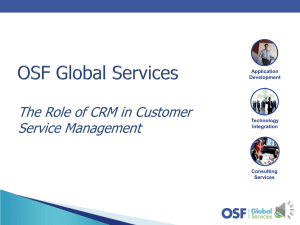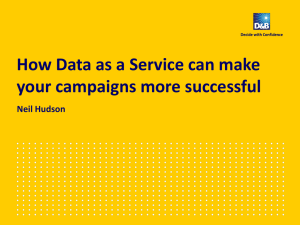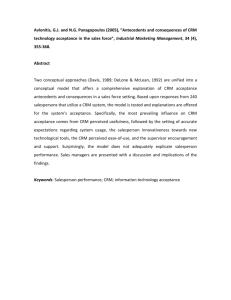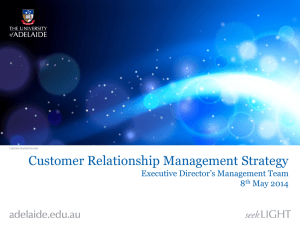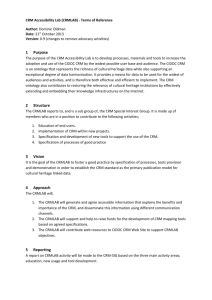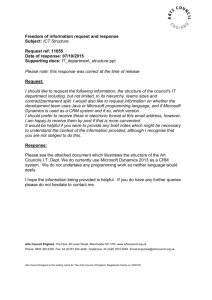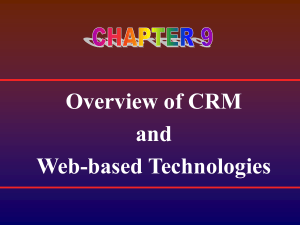Why do CEOs run shy of CRM? White Paper Published in “Making
advertisement
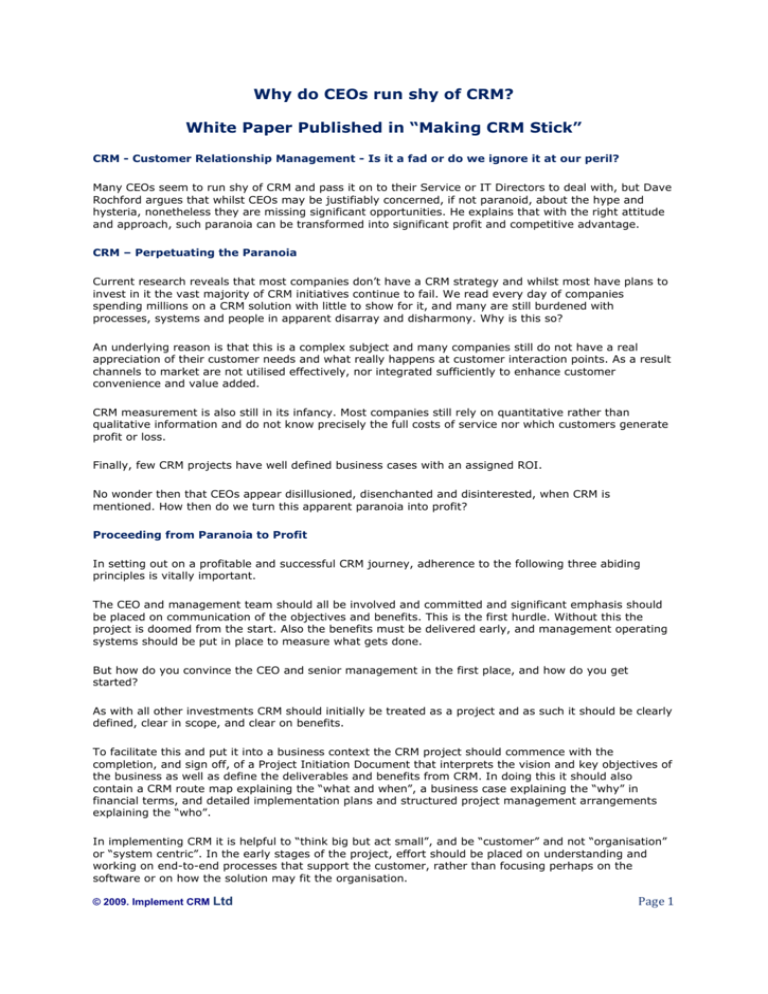
Why do CEOs run shy of CRM? White Paper Published in “Making CRM Stick” CRM - Customer Relationship Management - Is it a fad or do we ignore it at our peril? Many CEOs seem to run shy of CRM and pass it on to their Service or IT Directors to deal with, but Dave Rochford argues that whilst CEOs may be justifiably concerned, if not paranoid, about the hype and hysteria, nonetheless they are missing significant opportunities. He explains that with the right attitude and approach, such paranoia can be transformed into significant profit and competitive advantage. CRM – Perpetuating the Paranoia Current research reveals that most companies don’t have a CRM strategy and whilst most have plans to invest in it the vast majority of CRM initiatives continue to fail. We read every day of companies spending millions on a CRM solution with little to show for it, and many are still burdened with processes, systems and people in apparent disarray and disharmony. Why is this so? An underlying reason is that this is a complex subject and many companies still do not have a real appreciation of their customer needs and what really happens at customer interaction points. As a result channels to market are not utilised effectively, nor integrated sufficiently to enhance customer convenience and value added. CRM measurement is also still in its infancy. Most companies still rely on quantitative rather than qualitative information and do not know precisely the full costs of service nor which customers generate profit or loss. Finally, few CRM projects have well defined business cases with an assigned ROI. No wonder then that CEOs appear disillusioned, disenchanted and disinterested, when CRM is mentioned. How then do we turn this apparent paranoia into profit? Proceeding from Paranoia to Profit In setting out on a profitable and successful CRM journey, adherence to the following three abiding principles is vitally important. The CEO and management team should all be involved and committed and significant emphasis should be placed on communication of the objectives and benefits. This is the first hurdle. Without this the project is doomed from the start. Also the benefits must be delivered early, and management operating systems should be put in place to measure what gets done. But how do you convince the CEO and senior management in the first place, and how do you get started? As with all other investments CRM should initially be treated as a project and as such it should be clearly defined, clear in scope, and clear on benefits. To facilitate this and put it into a business context the CRM project should commence with the completion, and sign off, of a Project Initiation Document that interprets the vision and key objectives of the business as well as define the deliverables and benefits from CRM. In doing this it should also contain a CRM route map explaining the “what and when”, a business case explaining the “why” in financial terms, and detailed implementation plans and structured project management arrangements explaining the “who”. In implementing CRM it is helpful to “think big but act small”, and be “customer” and not “organisation” or “system centric”. In the early stages of the project, effort should be placed on understanding and working on end-to-end processes that support the customer, rather than focusing perhaps on the software or on how the solution may fit the organisation. © 2009. Implement CRM Ltd Page 1 Abiding by these simple but pragmatic principles should significantly improve the chances of success as well as deliver a good return on investment. Making it Happen Principles are one thing, but making it happen is another. Below are the critical factors that make for a successful CRM implementation. Getting the Right Balance As CRM is to be treated as a project, it should have a clear scope and well-defined objectives, robust plans, a sound business case, and a measurable and assigned ROI. Relevant, detailed analysis and evaluation is key to this. Often organisations either fail to give this sufficient weight and attention, resulting in a weak analyses and justification, or overdue it, with the result that people will not buy in to it. Getting the balance right is important - that is balance between seeing the big picture and detailed analysis, balance between people, systems and processes, and balance in terms of needs and what can be done. “Thinking big but acting small” is key to making it happen. Whilst it is important to set out a CRM route map that aligns itself with the vision and objectives that the organisation wishes to achieve, when eating the CRM elephant one should do it in small bite-size chunks that can be swallowed easily. Therefore, whilst the CRM route map will outline a logical sequence of changes that are required to processes, systems and organisation to improve customer management and profitability, the quick wins and improvements that can be implemented easily in a short time scale are key to organisational buy-in and bottom-line success. Thus, it is important that CRM is seen as a central part of the business, that it delivers early and demonstrable benefits, and that there is alignment with short and medium term business objectives. Changing the Processes Understanding and mapping of the key processes and systems involved in contacting and managing customers is also important. The people responsible for particular processes or systems should undertake this work. As it is customer focused it will invariably be cross - functional in scope and may require the appointment of process owners to manage it. Process owners must have delegated authority to effect change. Furthermore, mapping should not take 6-12 months to complete, as is often the case. In its simplest form “brown papers” (sheets or rolls of paper) can be used to document the existing key processes, systems, organisation and interactions, often in a matter of days. From these maps of existing processes and systems, white papers documenting the “to-be” or proposed CRM model can be developed, and from gap, evaluation and risk analyses, a route map and plan can be developed to implement the required changes, including quick wins. Quick Wins – the Route to Success So as the CRM route map and plan are essential guides to chart the overall journey, the quick wins are the immediate improvements that should deliver significant and demonstrable benefits. The quick wins will help to obtain buy-in to, and pay back on, the project. They will also provide management commitment and a financial contribution to the next stage of the project. What can be Measured gets Done © 2009. Implement CRM Ltd Page 2 All of this work will depend on capturing accurate and comprehensive information not only on customer needs and how they wish to be served, but also on current service performance, and the costs and profit involved in doing business with customers. Clean and comprehensive data is a pre-requisite - a factor often overlooked and which leads to project delays. It is key to obtaining reliable information and acceptance of baselines on performance, which should be put in place from day 1 of the project so that improvements can be monitored against them. Some investment in a database management system is also often required to consolidate and present a single view of the customer, which can then be seen by all relevant managers and staff. People - Make it Happen It’s people that make it happen and the core CRM project team should have representatives from different functions. The core team should also be full time and individually accountable. Insufficient resource and skill, and inadequate accountability are factors that often lead to failure. A sound business case and plans undertaken at the beginning of the project showing the resources, costs and returns should help overcome any resistance to releasing the resources required. This should then be monitored rigorously along with deliverables, benefits and time scales. Pitfalls to Avoid In summary, any of the following pitfalls can result in failure: • • • • • • • • lack of top management commitment unclear scope and definition poorly mapped and documented processes and systems inaccurate and unclean data absence of baseline measures of performance unstructured project management methodology inadequate resources, skills and accountabilities poor communication of the project. These and any other potential pitfalls should be identified at the beginning of the project and formalised in a risk mitigation plan that is agreed, monitored and remedied by senior management, usually in the forum of a project steering committee. Given the complexity and cross organisational nature of most CRM projects, strong project management is essential and needs to be backed up by the commitment of senior management, and in particular, the CEO. Realising the Benefits As a benchmark CEOs should aim to reduce costs and increase revenues by as much as 20% in the areas covered. This can have the effect of doubling profit. Again if sufficient focus and attention is given to implementing quick wins and short - term benefits then often investment costs can be recouped in year with multiple returns delivered on a recurring annual basis thereafter. CRM should be self-financing. If you think about it why shouldn’t this be the case? It’s only by treating our profitable and emerging customers that companies will be able to increase the value added to their business. Hence investment should be self-financing and should reap a significant return. So although CRM may inject abject fear and paranoia amongst most CEOs, if planned and implemented correctly the benefits can be significant. CEOs and, in particular, Finance Directors should take note! © 2009. Implement CRM Ltd Page 3 Dave Rochford is the Managing Director of Implement CRM and is a leading exponent of effective customer service and management. He has been assisting companies to implement profitable customer service and management solutions for the past 20 years. You can e mail him at dave.rochford@implementingcrm.com or call him on +44 (0) 7765 235912. © 2009. Implement CRM Ltd Page 4
